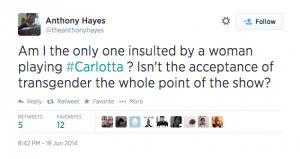tv review: carlotta
The ABC has broadcast a number of outstanding historical telemovies of late: from Paper Giants to Mabo, these period dramas have told stories of amazing Australians and documented social change in our country’s recent past. The latest offering in line with this trend is Carlotta, a film based on the life of Carol Byron, a transgender cabaret performer from Sydney who began her career in the 1960s. Carol began dressing as a woman, and eventually had a sex change operation at a time when “the op”, as her character describes it in the film, had only recently become available in Australia.
The telemovie tells the story of Carol’s life from her childhood to the peak of her career as a singer and dancer at the Kings Cross club Les Girls. As a child, Carol wanted to sing, dance and try on her mother’s jewellery—the film depicts his parents as unwilling to accept this from their child.
Years later, Carol (played by Jessica Marais) begins a job in a department store and meets some people who change everything: Ava (Eamon Farren) and Christopher (Socratis Otto). Ava dresses as a man for work but prefers to dress and look like a woman, and she encourages Carol to explore similar desires. Carol auditions for a spot in the Les Girls line up and begins a new life of singing, dancing and making new friends.
Yet not all are accepting, and Carol and the ‘Les Girls’ face abuse, discrimination and harassment. Life for Ava, in particular, is never easy, with an abusive partner and a brutal attack by police. Meanwhile, Carol is abandoned by her parents as her father leaves and her mother will not accept her as Carol instead of Richard. The film depicts a period of major transition for its lead character— eventually, Carol goes ahead with a sex change operation, despite her mother’s horror. She then meets and marries Peter (Ryan Johnson), but new challenges arise in this relationship as well. Throughout it all, Carol has her wonderful stage presence: Carlotta.
The sparkly aesthetic of this film, which is largely set in a cabaret club, does not distract from the hardships in Carol’s story and the lives of her friends. Many scenes are quite confronting, from Carol being beaten as young child by her father for singing and dancing in front of guests, police brutality and a drug overdose. In some ways, the film tells an inspirational story of finding one’s true self and embracing it, but in others it is a reminder of the discrimination and harassment that transgender people have faced — and still do face in society today. Ultimately, though, this is quite a personal story that focuses upon the life of one complex and endearing character.
It was somewhat surprising to hear that Jessica Marais had been cast as the lead in Carlotta—could the Packed to the Rafters actress really pull this off? But Marais was wonderfully compelling: she brought her character to life with vulnerability, confidence, fear and bravery all at once. Hers was a nuanced portrayal that did not reduce her character to one or two characteristics, doing justice to a story that should be told.
However, not everyone was happy with Marais in the role. When the film screened on Thursday night, some were questioning the casting of a woman. Actor Anthony Hayes (@theanthonyhayes) tweeted “Am I the only one insulted by a woman playing #Carlotta? Isn’t the acceptance of transgender the whole point of the show?”
It is worth noting that Carol herself was involved in the casting and wanted Marais for her likeness. Although the film does not directly address the casting issues, Carol, who acted as a consultant, has discussed the decision-making process behind the casting, and has said that Marais was the person who she felt bore the greatest resemblance to herself. She encouraged Marais make the character her own.
Whatever your thoughts on the choice of Marais, she was undoubtedly supported by a very strong cast. Anita Hegh as Carol’s mother, Evelyn, was particularly impressive in portraying the tensions of a relationship in which a conflicted mother eventually gave in to her concept of what was ‘right’ and ‘normal’ in society instead of supporting her child. The other standout performance of the film was Eamon Farron as Ava, who thoroughly inhabited the character and was memorable in his portrayal of the sadness and rejection his character faced.
Ultimately, the value of films or television programs that dramatise Australian history and its people was again made clear by this film. Drawing upon real stories puts names and faces to issues that still affect our society today— in this case, the challenges faced by those who do not identify with the gender that society expects them to, and the way they may be treated when they express themselves. One portrayal of a personal story is certainly not enough, but it is a start. Hopefully, this is just one of many such stories we will see on Australian television in the coming years. If television both reflects and shapes our society, then diverse portrayals of the human beings in this society are essential and welcomed.




Jessica is. great actor and without doubt beautiful …. but watched the show but it did not work that she was female … Definitely required a male actor for this role so we, the audience could empathise with Carol/Carlotta. To me, such a basic flaw but perhaps this us just me.
Carlotta is another brilliant art form through media. Jessica Morais is highly talented and Carol should have the right to choose who plays her. I remember carol from early television and am saddened to think she had to go through the ridicule of such imbecilic parents. I am still effected by what happened to Ava and think this police brutality is monsterous and should be arrest able behaviour